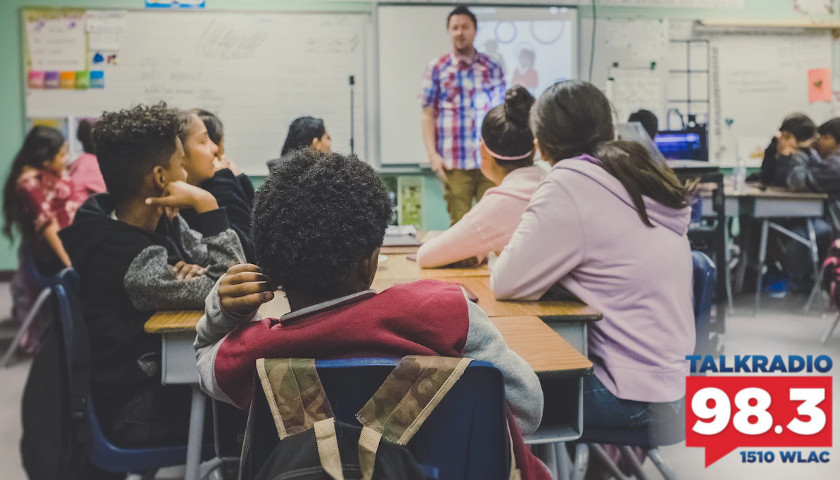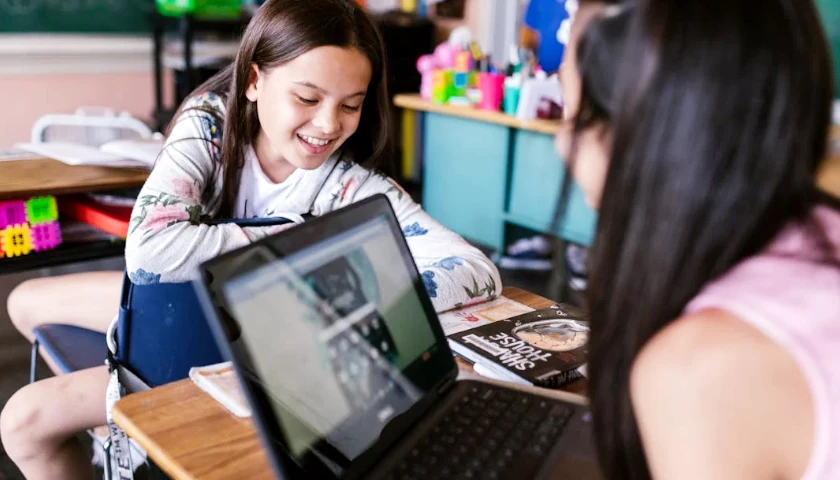Live from Music Row Wednesday morning on The Tennessee Star Report with Michael Patrick Leahy – broadcast on Nashville’s Talk Radio 98.3 and 1510 WLAC weekdays from 5:00 a.m. to 8:00 a.m. – host Leahy welcomed author Jenni White at The Federalist to discuss her recent piece which holds parents partially responsible for failing public education.
Leahy: We are joined by Jenni White, who has a terrific article at The Federalist. Five Ways Parents Are Responsible for Public Education Failures. Good morning, Jenni. Thanks for joining us.
White: Good morning, Michael. Thanks for having me.
Leahy: So you’re from Oklahoma, is that right?
White: Yes, sir, I am.
Leahy: And you own it. You have five kids that you home school.
White: (Chuckles) Fortunately, not anymore. I’m down to one homeschooler. I’ve finally gotten a bunch of them out of the house.
Leahy: And you own and operate a micro-farm, is that right?
White: Yes, that’s right. I get up early anyway. So that’s what you do on the farm.
Leahy: Is a micro-farm five acres or less?
White: Well, we have 10 acres, but, yes, I still designate it as that because we don’t have 200 acres.
Leahy: What do you grow? What do you have? Any animals?
White: Oh, yes, we have sheep. We have lots of birds. We have ducks and turkeys and chickens and lots of cats and dogs. People tend to leave dogs in the country someplace, and we tend to raise them up and cat.
Leahy: Do you have crops?
White: Well, we have a large garden. We don’t actually plant anything on a large-scale basis, but we just have a really big garden.
Leahy: So that keeps you pretty busy.
White: Pretty much yes. Especially right now. Although what’s going on with the weather? (Chuckles)
Leahy: Yeah, exactly. We like Oklahoma. Tennessee, Oklahoma, Texas, and Florida. These are states where liberty is still a possibility.
White: Absolutely.
Leahy: And I was very interested and intrigued by your article because it does say something about the duty parents have and the duties that they really have stopped exercising a little bit. The first of these five things that you say why parents are responsible for public education failures. The first one, parents believe it someone else’s job to educate their kids.
White: Yes. I mean, think about it. And I was that way, too. Even though I was a public school teacher. When my husband and I married we moved to a neighborhood because it had a ‘blue ribbon school’ which I found out later was kind of an erroneous designation. It’s kind of political. And we put our kids in it. And it wasn’t until then that I started noticing, even in elementary school, some of the stuff that was coming back about how Americans harmed Native Americans and about global warming. And I thought, oh, my gosh, what’s going on?
Leahy: This was back when? how long ago were you hearing about global warming from the school?
White: Oh, my gosh. That was all the way back in 2008 in my kids Elementary school.
Leahy: This is like their propaganda machines, aren’t they?
White: But it is. And I think it’s sad because parents don’t really understand. They think, just like I did when we first got started. These are great. It’s a neighborhood school. You can affect the neighborhood school. Well, I did try to affect the neighborhood school. I got on the PTA. I was on the PTA for four years, and in four years, all we managed to do the entire time was raise money selling whatever it was so we could get a computer lab.
And then after we got the computer lab, we had to get a gym. And I’m like, why don’t we get some good books? We need to get some good math books in here. What about Saxson math books? Well, they didn’t want to do that because it was all about competing with other schools and having this computer lab or a gym. And I’m thinking, guys, this isn’t what this isn’t the important thing here.
Kids need the math. I think parents are led down kind of a primrose path by educators and by school districts and by that whole kind of phenomena, I guess you could say of we’ll have a neighborhood school and our kids will walk and it’ll be great. And then they don’t really stop to think about what’s actually going on in the school.
Leahy: You said something very important at the beginning of this. You say parents have long begun to accept the brainwashing of Horace Mann that public schools were the repositories of all knowledge. Later, socialist John Dewey convinced administrators that public schools were to promote democracy by instituting social change, something parents couldn’t possibly do. Little by little, educrats began to convince parents public schools could parent and educate their children better than parents could.
White: Well, have you not heard people say, and I’ve heard this for years because I’ve been doing education research for well over a decade, and I go to talk places and parents will come up and they’ll just say, but I can’t educate my own kids. And I think, well, who tells you that you can’t educate your own kids? Well, the school and society tell you you can’t educate your own kids.
So we pay tax dollars into this institution that turns around and says, here, give me your kids. And then I’m not going to listen to anything you have to say, because I know better and you know nothing. And this is where we’ve got to put our feet down and just say, no, that’s not right. I’m the child’s parent.
If I don’t know this child better than anybody else, why am I turning that child over to somebody who doesn’t know them that well and expecting them to do as good of a job as I would in educating my child? Parents just really need to understand that just by the benefit of being that child’s parent, you’re the one that’s able to educate that child better than anybody else, whether you think so or not it’s just the truth.
Leahy: I think a lot of this has to do with time and money in this regard. When I was growing up in the 50s and the 60s, my parents I grew up in a little town in upstate New York, and the schools there weren’t trying to do social engineering. They were actually just trying to teach us how to read and write and do arithmetic.
And my parents had no worries about any indoctrination happening in those schools back in the 50s and 60s. But fast forward to today. Let’s say you have parents who are both working. What it seems to me now, the pressure, the economic pressures are if you take your kids out of public schools where now they’re being indoctrinated, one parent is going to have to stay home and there’s going to be less income in the family and they’re going to have to learn how to teach properly. I think that’s a big impediment. What are your thoughts on that?
White: In a way, I kind of disagree with you because there are ways around everything. In America, we’ve been conditioned to want and we don’t ever stop to think about need because we’re conditioned to think about want. I want the extra car. I want a bigger house. We never stop to think well, what do I actually need?
Well, there are many, many families and I’d even go so far as to say hundreds of thousands, if not millions of families that could easily downsize where they are right now and be in a smaller house. They’d still have two cars, but maybe do used cars or something so that one parent can stay home. It’s just that we choose not to do that because we don’t really want to.
It cramps our style. And then we make excuses for that. And that’s just the hard truth of it, frankly. But then even parents who, even if you downsize, can’t do that because for whatever reason, there are economic troubles and they just can’t do that. One of the great things about the pandemic and there was mainly one and it was this.
So many parents realized they actually could educate their own kids. And even those parents that were working did something called educational pods where they get together with other working parents and one day one parent would educate the kids and watch the kids. And then the next day, the next parent would do it the next day.
And so that way it was kind of a Round Robin where people got to work. But they also had made sure that their kids were at-home learning. And to tell you the truth, online right now, you can find all kinds of great classical home educational literature that is just literally an Internet search away. It’s simply not hard to do anymore. Back in the 60s when people who are starting out doing this it was impossible almost. But now it’s super easy to do.
Leahy: So you talk about pods, and now you’ve probably started the history on this more than I have. I think my recollection is that public education really began in the 1850s or so with Horace Mann. Before that time in America, little communities would kind of do the pod thing like you’re talking about.
They would ban together. They’d pull a little bit of their money, they’d hire somebody to come in and teach the kids for a period of time, and the parents directly controlled what happened. Do I have that right?
White: Oh, you have it absolutely correct. And the more affluent families would hire tutors and they would do it at homes and churches. That’s one of the many things that churches had abdicated in their responsibilities and one of them was they were a repository for learning.
There would be parents who would bring their kids there and the teacher would actually teach inside the Church. And we just don’t do any of those things anymore because we would apparently much rather in debt our property to bonds to create these new buildings for public schools.
Listen to the full first hour here:
– – –
Tune in weekdays from 5:00 – 8:00 a.m. to the Tennessee Star Report with Michael Patrick Leahy on Talk Radio 98.3 FM WLAC 1510. Listen online at iHeart Radio.





